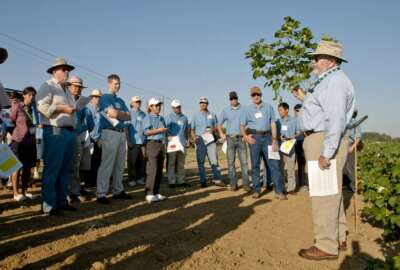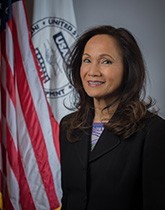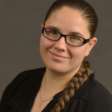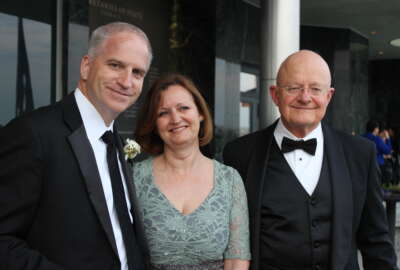
USAID employee receives award for dedication to global resilience
Gloria Steele has been called a visionary and a dreamer by people who've benefited from her work. In 2018, she's won her third presidential rank award.
Best listening experience is on Chrome, Firefox or Safari. Subscribe to Federal Drive’s daily audio interviews on Apple Podcasts or PodcastOne.

An accomplished member of the Senior Executive Service, Gloria Steele has been called a visionary and dreamer by people who have benefited from her work at the U.S. Agency for International Development. She’s long known the value of American foreign aid and how to work it in effective ways.
Steele, acting assistant administrator at USAID’s Asia bureau, is a recipient of a 2018 Presidential Rank Award for distinguished executive.
Her government career did not start in the United States. Born and raised in the Philippines, Steele first dipped her toes into the public sector as a management consultant to the island’s secretary of agriculture. As the island was still developing, her team worked with the private sector, civil society and universities to spark growth in both GDP and improving governance.
“The stars were aligned when I got there. The president was committed to achieving growth, to alleviating [and] eliminating poverty and he identified corruption as a major source of poverty in the Philippines,” Steele said on Federal Drive with Tom Temin.
Her work was highly esteemed in Manila and was recognized too by the USAID partners in the country at the time. The agency offered her a scholarship to receive her master’s degree in agricultural economics from Kansas State University.
“It was probably one of the best years of my life,” she said.
Entering the U.S. workforce
Through her education and career, Steele witnessed the work USAID did to help stimulate growth in areas abroad. She said she’d long been a fan of the agency and its ideals.
“I really liked the mandate of USAID. Which is, to help with countries on a journey where they will no longer need assistance,” she said. “We call it self-reliance and I think it’s really important to do that.”
Nearly four decades later, Steele has a plethora of stories from her positions all over the world helping countries in need get back on their feet — from post-Soviet countries to other areas in Africa and Asia. Most of her time in the civil service thus far, however, was spent helping countries in Eastern Europe and Eurasia build themselves back up after the fall of the Berlin Wall and the end of the Cold War.
“One of the things I did was to identify areas that [these countries] needed to work on so that they could be where they needed to be,” she said. “A lot of them indeed graduated from U.S. government assistance by tracking and looking at where they were falling behind and basically it was around private decision. And there was a lot of interest.”
Related Stories
“[It’s] the only region in the world where we have the highest number of countries [where] we are no longer present,” she said.
The USAID journey is focused on leveling the playing field between the public and private sector so they can work together to invest in the growth of the country, she said. Strengthening democratic systems and training governments to manage their natural resources are also two of Steele’s priorities in her position. In the 38 years she’s worked for USAID, she said the methods may have changed, but the goal remains the same.
“The commitment to building capacity has remained from the time I started working in aid,” she said.
Steele also helped the agency change its mindset from treating aid programs as a donor-recipient relationship to more of a partnership.
“I think one of the lessons we’ve learned over time is that when we view these people in these countries as partners, we get farther along in the process of development and transformation,” she said. “All of us have a role to play and we can make a better contribution no matter where we are in government.”
She can now add her 2018 award to her trophy shelf. She received her first presidential rank award for meritorious executive in 2007 and her first award for distinguished executive in 2008. Now, as a member of the SES, she said she’s dedicated to helping others reach their potential and encouraging student interns to join the fight for international development.
“It is really important to give back and develop the future leaders of our agency,” she said.
Copyright © 2024 Federal News Network. All rights reserved. This website is not intended for users located within the European Economic Area.
Steff Thomas is a digital editor at Federal News Network.





